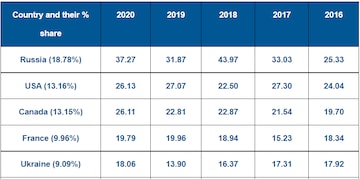
The prices in the commodity space will largely remain elevated for a few months to a year with the food inflation unlikely to go down from the current levels as supply-side concerns remain amid the ongoing Ukraine-Russia war, according to experts.
According to Carlos Mera Arzeno, Senior Commodity Analyst at Rabobank, the high global prices of wheat, sugar and edible oil may not collapse from the current levels anytime soon.
“Don’t expect food prices reverting to pre-war levels,” said Arzeno in an interview with CNBC-TV18.
The global wheat prices have doubled recently mainly due to the Russia-Ukraine conflict and the crops in the US getting affected due to the dry winter and soggy spring. Russia and the US are the top two exporters of wheat.
Countries with largest share in the overall quantity of wheat export:
 Source: Government data
Source: Government data“If we look at the US, the crop conditions for winter wheat, which is a majority of the wheat in the US, were disastrous… In Europe, it has been quite dry in the last three months and we are expecting a heat wave… It might not be a disaster but certainly Europe is not going to be very aggressive in exporting in the next 12 months. The Russian crop is relatively good and it has been exported, but it's anyone's guess how Russia will export in the next 12 months,” said Arzeno.
Similarly, since the war-hit Ukraine is responsible for more than half of the world's export of sunflower oil, the prices are expected to remain elevated at least for the next 12 months.
“I think we are going to see, in the next 12 months, the war still raging up and Ukraine still unable to export large amount of sunflower seeds, sunflower oils,” he said. Corn prices too are unlikely to fall with Ukraine being a large producer.
While sugar is not directly affected by the war, the skyrocketing energy prices are leading to sugarcane being diverted for ethanol to increase fuel blending, which in turn, is raising the rates for sugar. Adding to the jump in prices is the bad weather affecting the crops, he said.
The wheat, sugar and corn prices, though off their multi-year highs, are sharply up compared to last year.
India has announced a ban on wheat exports while it has put a cap on sugar exports at 100 lakh metric tonnes (LMT) owing to higher prices.
Ole Hansen, analyst, Saxobank, also said that the supply-side concerns will keep the commodity prices high though recession is expected to begin in the second quarter of FY23. "Even if we do get an economic slowdown, the underlying trends will be supported just simply because supply is not as strong as it has been.”
Giving an example of oil, he explained that the oil prices have remained elevated despite risk of recession in the past weeks on supply-side concerns.
Talking about metals, Hansen said that the prices could move higher in the coming quarters and years. He added that industrial metals have corrected around 25 percent from March highs due to factors such as COVID-induced lockdown in China.
"Could see markets remaining tight and prices moving higher for metals as well... Supply outlook tighter for the energy space considering Russia is such an important part," he said.
However, according to him, there could be some correction in the agri commodity space.
First Published: Jun 15, 2022 4:12 PM IST
Check out our in-depth Market Coverage, Business News & get real-time Stock Market Updates on CNBC-TV18. Also, Watch our channels CNBC-TV18, CNBC Awaaz and CNBC Bajar Live on-the-go!


2024 Lok Sabha Elections | Why Kerala is in focus as the second phase begins to vote
Apr 26, 2024 9:33 AM
Bengaluru Rural Lok Sabha election: Over 35% voter turnout recorded by 1 pm
Apr 26, 2024 9:11 AM

